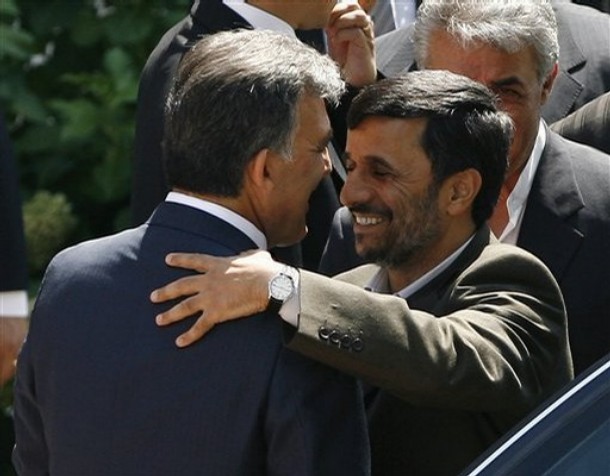
Turkey-Iran Relations: A Trade Partnership or a Gateway for Iran to Escape International Sanctions?
Publication: Eurasia Daily Monitor Volume: 6 Issue: 41
By:

While the international community has been discussing whether Iran finally has the technological capacity to produce nuclear weapons, the diplomatic traffic between Turkey and Iran has been increasing. In addition to Iranian President Mahmoud Ahmadinejad’s visit to Turkey, nine meetings at the ministerial level were held in 2008 (December 20, 2008).
Iranian Foreign Minister Manouchehr Mottaki emphasized the energy deals between the two countries and said that "the train of bilateral relations is moving in a good condition" (Tehran Times, July 20, 2008).
It seems that the diplomatic traffic between the two countries will continue to increase in 2009. In January Ali Larijani, the president of the Iranian parliament, went to Turkey and met with Turkish President Abdullah Gul and Prime Minister Recep Tayyip Erdogan (CNNTurk, January 13). Moreover, the year 2009 has been designated as "Iran-Turkey Culture Year" (Cihan News Agency, August 21, 2008). Joint cultural activities have already been organized in Turkey. Marmara University and the Iranian Consulate in Istanbul, for example, have arranged an "Iran-Turkey Cultural Relations Conference" (IRNA, January 19, 2009).
On March 1 Turkish Minister of Transportation Binali Yildirim visited Tehran and signed a memorandum of understanding to improve the transportation routes between the two countries (CNNTurk, March 2009).
On March 10 and 11 Gul will visit Tehran to attend the summit of the Economic Cooperation Organization (ECO), and Turkish Foreign Minister Ali Babacan will go to Tehran to attend ministerial-level meetings as part of the ECO summit. Iran Daily reported that the "the main topic of the summit is Caspian Basin energy development. The summit offers an ideal venue for regional energy players to discuss an export arrangement that circumvents Russia" (Iran Daily, March 2).
It appears that during the summit Iran will try to convince Central Asian countries to support Iran’s proposal to bring Caspian Basin gas to world markets through Iranian territory. Iran’s proposal at this stage seems to conflict with Turkey’s support for the Nabucco pipeline project. Iran Daily reported that the Iranian and Turkmen governments had signed an agreement to allow Iran to develop the Yolotan gas field in Turkmenistan. With this deal, Iran will buy an additional 350 billion cubic feet of gas annually. In addition to Iran’s gas contract with Turkmenistan, Tehran recently offered to buy a 10 percent stake in the second phase of Azerbaijan’s Shah-Deniz gas field for $1.7 billion. For the West, these gas agreements could pose major challenges to several pipeline plans, especially the proposed Nabucco line (Iran Daily, March 2).
Perhaps the ECO Summit in Tehran will prove a real challenge for Turkey to pursue its own agenda in support of the Nabucco pipeline and against Iran’s interests. Although Iran has offered to be a gas supplier to Nabucco, the United States strongly opposes the idea. Given that the United States and EU oppose Iran’s proposal to be an alternative gas supplier to Europe, Iran could pursue a strategy of using its relations with Russia, which is strongly against the Nabucco project, to influence Turkmenistan to thwart the Nabucco project. The real test for Turkey is to convince the Central Asian countries to support Nabucco rather than the projects proposed by Iran. It remains to be seen whether such competition will turn into a confrontation between Iran and Turkey.
In addition to Gul’s visit to Iran, the diplomatic traffic between the two countries will still continue in March. On March 15 Iranian President Mahmoud Ahmadinejad will go to Istanbul for the fifth World Water Forum (Zaman, March 3). Ahmadinejad’s agenda in Turkey has not yet been revealed, but the visit itself demonstrates that Iran is using every opportunity available to break out of its isolation from the international community.
Turkey is becoming a hub for Iranian efforts to communicate with the West in its attempts to end this isolation. Erdogan recently revealed that while President Bush was still in office, Iranian authorities asked Turkey to be a mediator between United States and Iran in order to normalize their relations (CNNTurk, February 25). It still remains to be seen whether becoming a center for Iran’s foreign policy will benefit Turkey’s own strategy to join the EU and become an important diplomatic force in the region.
Economically, Turkey and Iran set the goal of doubling their $10 billion in trade to $20 billion by 2011. (Journal of Turkish Weekly, January 27; Mehr News Agency, January 29).
With this perspective, Minister of State for Customs and Foreign Trade Kursat Tuzmen visited Tehran to look for new opportunities to expand economic relations (IRNA, January 27), and Iranian Deputy Minister of Industry and Mines Ahmed Kale Bani visited Turkey to attend the Turkey 2009 trade fair in Istanbul (www.trkhaber.com, February 6).
Turkey’s exports to Iran amount to $1.87 billion while its imports are $7.84 billion and consist mostly of energy imports. It seems that Turkey’s primary interest in its relations with Iran is economic, while Iran wants better relations with Turkey as a means to break out of its international isolation.
What has isolated Iran from the rest of the world in recent years is its ambition to possess nuclear weapons. Turkey does not support Tehran’s nuclear ambitions, however. Despite deepening diplomatic relations, Iranian nuclear ambitions have never become an official part of Turkey and Iran’s bilateral agenda. Thus, despite the improvement, it is impossible to predict what will happen to Turkish-Iranian relations when the international community finally decides how to deal with Iran.




